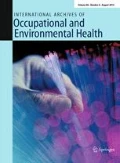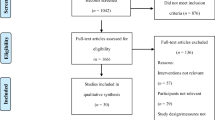Abstract
Purpose
The Copenhagen Psychosocial Questionnaire (COPSOQ I) was developed as a tool to assess a broad range of psychosocial work environment factors and was recently revised (COPSOQ II). The research question in this study was: Do COPSOQ II-scales predict a high need for recovery (NFR) after work better than COPSOQ I-scales?
Methods
A cross-sectional questionnaire study was conducted in 990 subjects (84.5% response), employed in the public sector. Psychosocial factors were assessed by COPSOQ I and COPSOQ II. Multivariate logistic regression analysis was used to calculate the odds ratios for the presence of a high NFR, controlled for gender, age, physical workload and other relevant occupational and non-occupational factors. Analyses were performed for COPSOQ I and COPSOQ II separately.
Results
In both COPSOQ versions, ‘quantitative demands’ (p < 0.001) and ‘job insecurity’ (p < 0.005) were significantly associated with a high NFR. Additionally, in the COPSOQ I model, ‘demands for hiding emotions’ (p < 0.05) and ‘degrees of freedom’ (p < 0.05), and in the COPSOQ II model ‘emotional demands’ (p < 0.05) and ‘commitment to the workplace’ (p < 0.005) were significant as well. ‘Degrees of freedom’ was omitted by the developers in the revised COPSOQ II. Reintroducing it into the COPSOQ II model did not alter the existing associations, but pointed out ‘degrees of freedom’ to be an additional important dimension (p < 0.05). The COPSOQ II model with ‘degrees of freedom’ included also had the best data fit.
Conclusions
The results suggested the COPSOQ II to be better predictive than COPSOQ I for a high NFR, but also indicated that ‘degrees of freedom’ should be included into the COPSOQ II when studying the NFR as outcome parameter.
Similar content being viewed by others
References
Bernert RA, Merrill KA, Braithwaite SR, Van Orden KA, Joiner TE Jr (2007) Family life stress and insomnia symptoms in a prospective evaluation of young adults. J Fam Psychol 21:58–66
Broersen JPJ, Fortuin RJ, Dijkstra M, van Veldhoven M, Prins J (2004) Monitor arboconvenanten: kengetallen en grenswaarden [in Dutch: monitor occupational health and safety: key figures and limits]. Tijdschrift voor Bedrijfs-en Verzekeringsgeneeskunde 12:100–104
Burr H, Albertsen K, Rugulies R, Hannerz H (2010) Do dimensions from the Copenhagen Psychosocial Questionnaire predict vitality and mental health over and above the job strain and effort–reward imbalance models? Scand J Public Health 38(Suppl 3):59–68
Checkoway H, Pearce N, Kriebel D (2004) Research methods in occupational epidemiology, 2nd edn. Oxford University Press, New York
Clausen T, Nielsen K, Carneiro IG, Borg V (2012) Job demands, job resources and long-term sickness absence in the Danish eldercare services: a prospective analysis of register-based outcomes. J Adv Nurs 68:127–136
de Croon EM, Sluiter JK, Frings-Dresen MHW (2003) Need for recovery after work predicts sickness absence. A 2-years prospective cohort study in truck drivers. J Psychosom Res 55:331–339
de Croon EM, Sluiter JK, Blonk RWB, Broersen JPJ, Frings-Dresen MHW (2004) Stressful work, psychological job strain, and turnover: a 2-year prospective cohort study of truck drivers. J Appl Psychol 89:442–454
de Croon EM, Sluiter JK, Frings-Dresen MHW (2006) Psychometric properties of the need for recovery after work scale: test-retest reliability and sensitivity to detect change. J Occup Environ Med 63:202–206
Jansen NWH, Kant IJ, van Amelsvoort LGPM, Nijhuis FJN, van den Brandt PA (2003) Need for recovery from work: evaluating shortterm effects of working hours, patterns and schedules. Ergonomics 46:664–680
Kinnunen U, Mauno S, Siltaloppi M (2010) Job insecurity, recovery and well-being at work: recovery experiences as moderators. Econ Ind Democr 31:179–194
Kiss P, De Meester M (2009) Impact of psychosocial work environment factors measured by the COPSOQ on the need for recovery after work in ageing workers. Preliminary results. In: Kumashiro M (ed) Promotion of work ability towards a productive aging. Taylor & Francis, London, pp 239–245
Kiss P, De Meester M, Braeckman L (2008) Differences between younger and older workers in the need for recovery after work. Int Arch Occup Environ Health 81:311–320
Kivimäki M, Elovainio M, Vahtera J, Ferrie JE (2003) Organisational justice and health of employees: prospective cohort study. Occup Environ Med 60:27–34
Kristensen TS, Hannerz H, Høgh A, Borg V (2005) The Copenhagen Psychosocial Questionnaire (COPSOQ). A tool for the assessment and improvement of the psychosocial work environment. Scand J Work Environ Health 31:438–449
Mohren DCL, Jansen NWH, Kant IJ (2010) Need for recovery from work in relation to age: a prospective cohort study. Int Arch Occup Environ Health 83:553–556
Moos RH, Schutte KK, Brennan PL, Moos BS (2005) The interplay between life stressors and depressive symptoms among older adults. J Gerontol B Psychol Sci Soc Sci 60:199–206
National Research Center for the Working Environment (NRCWE) (2007) The construction of the scales in COPSOQ II. http://www.arbejdsmiljoforskning.dk/en/publikationer/spoergeskemaer/psykisk-arbejdsmiljoe. Accessed 14 September 2011
Netterstrøm B, Conrad N, Bech P, Fink P, Olsen O, Rugulies R, Stansfeld S (2008) The relation between work-related psychosocial factors and the development of depression. Epidemiol Rev 30:118–132
Pejtersen JH, Kristensen TS, Borg V, Bjorner JB (2010) The second version of the Copenhagen Psychosocial Questionnaire. Scand J Public Health 38(Suppl 3):8–24
Podsakoff PM, MacKenzie SB, Podsakoff NP, Lee JY (2003) Common method bias in behavioral research: a critical review of the literature and recommended remedies. J Appl Psychol 88:879–903
Rugulies R, Aust B, Pejtersen JH (2010) Do psychosocial work environment factors measured with scales from the Copenhagen Psychosocial Questionnaire predict register-based sickness absence of 3 weeks or more in Denmark? Scand J Public Health 38(Suppl 3):42–50
Siegrist J (1996) Adverse health effects of high-effort/low-reward conditions. J Occup Health Psychol 1:27–41
Siltaloppi M, Kinnunen U, Feldt T, Tolvanen A (2011) Identifying patterns of recovery experiences and their links to psychological outcomes across one year. Int Arch Occup Environ Health 84:877–888
Sluiter JK, Van der Beek AJ, Frings-Dresen MHW (1999) The influence of work characteristics on the need for recovery and experienced health: a study on coach drivers. Ergonomics 42:573–583
Sluiter JK, Frings-Dresen MH, van der Beek AJ, Meijman TF (2001) The relation between work-induced neuroendocrine reactivity and recovery, subjective need for recovery, and health status. J Psychosom Res 50:29–37
Sluiter JK, de Croon EM, Meijman TF, Frings-Dresen MHW (2003) Need for recovery from work related fatigue and its role in the development and prediction of subjective health complaints. Occup Environ Med 60(Suppl 1):i62–i70
Sonnentag S, Zijlstra FRH (2006) Job characteristics and off-job activities as predictors of need for recovery, well-being, and fatigue. J Appl Psychol 91:330–350
Swaen GMH, van Amelsfoort LGPM, Bültmann U, Kant IJ (2003) Fatigue as a risk factor for being injured in an occupational accident: results from the Maastricht Cohort. J Occup Environ Med 60(Suppl I):i88–i92
Thorsen SV, Bjorner JB (2010) Reliability of the Copenhagen Psychosocial Questionnaire. Scand J Public Health 38(Suppl 3):25–32
van Amelsfoort LGPM, Kant IJ, Bültmann U, Swaen GMH (2003) Need for recovery after work and the subsequent risk of cardiovascular disease in a working population. J Occup Environ Med 60:i83–i87
van Veldhoven M, Broersen S (2003) Measurement quality and validity of the “need for recovery scale”. Occup Environ Med 60(Suppl 1):i3–i9
van Veldhoven MJPM, Sluiter JK (2009) Work-related recovery opportunities: testing scale properties and validity in relation to health. Int Arch Occup Environ Health 82:1065–1075
Verdonk P, Hooftman WE, van Veldhoven MJPM, Boelens LRM, Koppes LLJ (2010) Work-related fatigue: the specific case of highly educated women in the Netherlands. Int Arch Occup Environ Health 83:309–321
Conflict of interest
The authors declare that they have no conflict of interest.
Author information
Authors and Affiliations
Corresponding author
Rights and permissions
About this article
Cite this article
Kiss, P., De Meester, M., Kruse, A. et al. Comparison between the first and second versions of the Copenhagen Psychosocial Questionnaire: psychosocial risk factors for a high need for recovery after work. Int Arch Occup Environ Health 86, 17–24 (2013). https://doi.org/10.1007/s00420-012-0741-0
Received:
Accepted:
Published:
Issue Date:
DOI: https://doi.org/10.1007/s00420-012-0741-0




